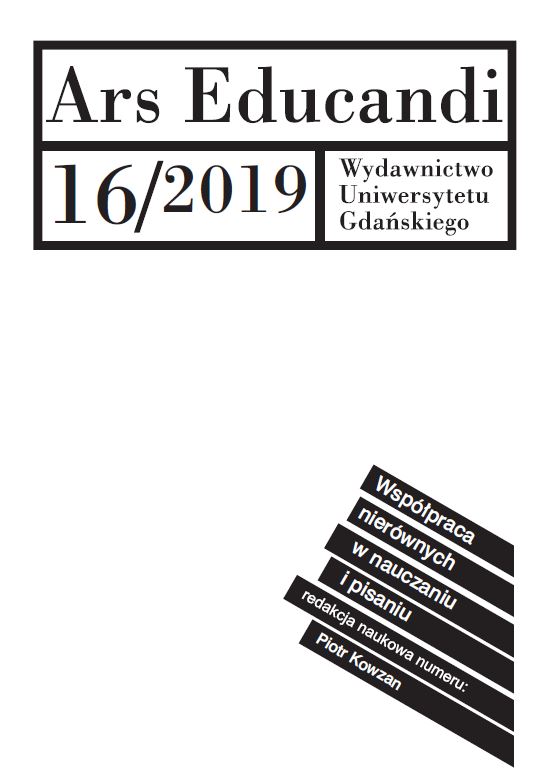Co-authorship: exploitation and cooperation (with students)
DOI:
https://doi.org/10.26881/ae.2019.16.11Keywords:
ethics, standards, cooperation, authorshipAbstract
The goal of the article is to identify such organizational solutions in the field of research collaboration with students that would be ethical from the perspective of subsequent co-authorship of articles and beneficial to both students and academic staff. For this purpose, we consider three different models of working together (coordination, cooperation and collaboration) which organize relations in the team in a specific way. We consider the possibilities and limitations of these models against the background of contemporary challenges of academic work and formal requirements for co-authoring articles This will result in a comparison of the opportunities and threats of individual solutions, which – together with three models of organizing collective work – can form the basis of a decision-making scheme on how to organize such work with students.
Downloads
References
Ackerman, M., & Brânzei, S. (2017). The Authorship Dilemma: Alphabetical or Contribution? Autonomous Agents and Multi-Agent Systems, 31(5), 1077–1093.
Amici, F., & Bietti, L. M. (2015). Coordination , collaboration and cooperation. Interdisciplinary perspectives. Interaction Studies, 16(3), 7–12.
Association, A. P. (2020). Publication manual of the American Psychological Association. Washington: American Psychological Association.
Bornowska, K., Jendza, J., & Zamojski, P. (2009). Ambiwalencja selekcji w szkole wyższej. (Na przykładzie kwestii jakości kształcenia pedagogów). Problemy Wczesnej Edukacji, 9(1), 119–137.
Brabazon, T. (2016). Winter is Coming: Doctoral Supervision in the Neoliberal University. International Journal of Social Sciences & Educational Studies, 3(1), 14–34.
Bruno, B. (2014). Economics of co-authorship. Economic Analysis and Policy, 44(2), 212–220. https://doi.org/10.1016/j.eap.2014.05.003
Červinková, H. (2013). Etnografia edukacyjna i badania w działaniu – z warsztatu kształcenia nauczycieli. Forum Oświatowe, 1(48), 123–137.
Costa, M. M., & Gatz, M. (1992). Determination of authorship credit in published dissertations. Psychological Science, 3(6), 354–357.
Ductor, L. (2015). Does co-authorship lead to higher academic productivity? Oxford Bulletin of Economics and Statistics, 77(3), 385–407. https://doi.org/10.1111/obes.12070
Erren, T. C., Groß, J. V., Wild, U., Lewis, P., & Shaw, D. M. (2017). Crediting animals in scientific literature. EMBO Reports, 18(1), 18–20. https://doi.org/10.15252/embr.201643618
Fine, M. A., & Kurdek, L. A. (2010). Reflections on determining authorship credit and authorship order on faculty-student collaborations. American Psychologist, 48(11), 1141–1147.
Fisher, C. B. (2017). Decoding the Ethics Code: A Practical Guide for Psychologists (4th ed.). Los Angeles, Lndon, New Delhi, Singapore, Washington DC, Melbourne: Sage Publications.
Geminiani, A., Ercoli, C., Feng, C., & Caton, J. G. (2014). Bibliometrics Study on Authorship Trends in Periodontal Literature From 1995 to 2010. Journal of Periodontology, 85(5), e136–e143. https://doi.org/10.1902/jop.2013.130354
Goodyear, R. K., Crego, C. A., & Johnston, M. W. (1992). Ethical Issues in the Supervision of Student Research: A Study of Critical Incidents. Professional Psychology: Research and Practice, 23(3), 203–210. https://doi.org/10.1037/0735-7028.23.3.203
Horner, J., & Minifie, F. D. (2011). Research ethics III: Publication practices and authorship, conflicts of interest, and research misconduct. Journal of Speech, Language, and Hearing Research, 54(1), 346–362. https://doi.org/10.1044/1092-4388(2010/09-0263)
Kadel, A., & Walter, A. (2015). Do scholars in Economics and Finance react to alphabetical discrimination? Finance Research Letters, 14(May), 64–68. https://doi.org/10.1016/j.frl.2015.05.015
Kwiek, M. (2019). Indywidualna produktywność naukowa i konsekwencje rosnącej stratyfikacji społecznej w nauce. Poznań.
Maurer, T. W. (2017). Guidelines for authorship credit, order, and co-inquirer learning in collaborative faculty-student SOTL projects. Teaching and Learning Inquiry, 5(1). https://doi.org/10.20343/teachlearninqu.5.1.9
Mercer-Mapstone, L., Dvorakova, S. L., Matthews, K. E., Abbot, S., Cheng, B., Felten, P., … Swaim, K. (2017). A Systematic Literature Review of Students as Partners in Higher Education. International Journal for Students as Partners, 1(1), 1–23. https://doi.org/10.15173/ijsap.v1i1.3119
Min, S.-K. (2019). Unjustified Authorship such as Gift Authorship for Your Kids: It Is a Crime, Professor. Vascular Specialist International, 35(4), 181–183. https://doi.org/10.5758/vsi.2019.35.4.181
Moffatt, B. (2011). Responsible authorship: Why researchers must forgo honorary authorship. Accountability in Research, 18(2), 76–90. https://doi.org/10.1080/08989621.2011.557297
Moustafa, K. (2016). Contributorships Are Not “Weighable” to be Equal. Trends in Biochemical Sciences, 41(5), 389–390. https://doi.org/10.1016/j.tibs.2016.03.001
Naezer, M., Benschop, Y., & van den Brink, M. (2019). Harassment in Dutch academia. Exploring manifestations, facilitating factors, effects and solutions. Utrecht.
Pollard, D. (2005). Will That Be Coordination, Cooperation, or Collaboration? Retrieved from http://howtosavetheworld.ca/2005/03/25/will-that-be-coordination-cooperation-or-collaboration/
Robertson, J. (2007). Beyond the ‘research/teaching nexus’: exploring the complexity of academic experience. Studies in Higher Education, 32(5), 541–556. https://doi.org/10.1080/03075070701476043
Sauermann, H., & Haeussler, C. (2017). Authorship and contribution disclosures. Science Advances, 3(11). https://doi.org/10.1126/sciadv.1700404
Scassa, T., & Chung, H. (2015). Typology of Citizen Science Projects from and Intellectual Property Perspective: Invention and Authorship Between Researchers and Participants (policy memo series) (Vol. 5). Washington. Retrieved from http://www.wilsoncenter.org/publication/typology-citizen-science-projects-intellectual-property-perspective
Shapiro, D. W. (1994). The contributions of authors to multiauthored biomedical research papers. JAMA: The Journal of the American Medical Association, 271(6), 438–442. https://doi.org/10.1001/jama.271.6.438
Shaw, D. (2011). The authorless paper. British Medical Journal, 343(7831), 999.
Sikes, P. (2009). Will the real author come forward? Questions of ethics, plagiarism, theft and collusion in academic research writing. International Journal of Research and Method in Education, 32(1), 13–24. https://doi.org/10.1080/17437270902749247
Staff, J., Owners, D. J., Freedom, E., Corrections, A., Misconduct, B. S., Copyright, C., … Trials, L. C. (2015). Recommendations for the conduct, reporting, editing, and Publication of Scholarly Work in Medical Journals. Chinese Nursing Research, 2(4), I–XIII. https://doi.org/10.1016/j.cnre.2016.01.001
Szadkowski, K. (2015). Postoperaistyczne spojrzenie na pracę produkcyjną i nieprodukcyjną w nauce i szkolnictwie wyższym. Praktyka Teoretyczna, 18(4), 62. https://doi.org/10.14746/prt.2015.4.3
Szwabowski, O., & Wężniejewska, P. (2017). An (co)autoethnographic story about going against the neoliberal didactic machine. Journal for Critical Education Policy Studies, 15(3), 105–144.
Tight, M. (2016). Examining the research/teaching nexus. European Journal of Higher Education, 6(4), 293–311. https://doi.org/10.1080/21568235.2016.1224674
Victor, B. G., Hodge, D. R., Perron, B. E., Vaughn, M. G., & Salas-Wright, C. P. (2017). The rise of co-authorship in social work scholarship: A longitudinal study of collaboration and article quality, 1989-2013. British Journal of Social Work, 47(8), 2201–2216. https://doi.org/10.1093/bjsw/bcw059
Zomorrodian, A. (2011). New approach to strategic planning: The impact of leadership and culture on plan implantation via the three Cs: Cooperation, collaboration and coordination. ASBBS Annual Conference, 18(1), 1121–1132. https://doi.org/10.2139/ssrn.1777307

 Academic Scientific Journals
Academic Scientific Journals




